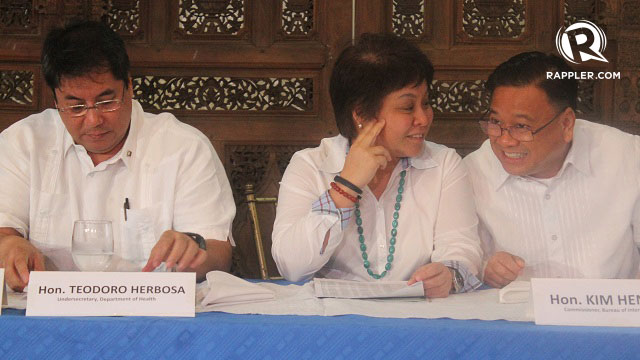SUMMARY
This is AI generated summarization, which may have errors. For context, always refer to the full article.

MANILA, Philippines – One year is too soon to measure whether the sin tax law has made any significant impact on public health, the health chief said on Friday, December 20.
One thing is for sure, however: revenues resulting from increased excise taxes is giving the Department of Health (DOH) its largest budget increase in history, according to Secretary Enrique’s statement – 58%, from P53 billion in 2013 to approximately P84 billion in 2014.
Republic Act 10351, signed exactly a year ago, was intended to increase the excise tax imposed on tobacco and alcohol products for a double purpose: increase government revenue and discourage smokers with high prices.
Part of the sin tax collection will be allotted for the government’s universal health care program. (WATCH: BISYO: A special report on Sin Tax)
“While it is still too early to exactly determine the public health impact of RA 10351 one year after it was signed into law by President Benigno Aquino III, this has greatly enhanced the excise tax collections, which would translate to a significant increase in funding for our health programs,” Ona said in a statement read by DOH Undersecretary Ted Herbosa in a forum of health advocates on Friday.
DOH’s own survey among Cotabato teens, however, show signs that the sin tax law “is slightly driving down smoking in the Philippines.”
The law imposes higher taxes on tobacco and alcohol products, overcoming a strong industry lobby that kept prices in the Philippines among the cheapest in the world. (READ: Cigarette prices up after sin tax law takes effect)
Ona said incremental revenues from the law will be used to fund the following:
- PhilHealth premium subsidy of the poor and near-poor
- Fund the upgrading and modernization of government hospitals and health facilities
- Expand public health programs, such as immunization, to reach the country’s Millenium Development Goals
- Hire needed health workers
- Fund health promotion and implementation research to support Universal Health Care
In a period of 10 years, he said, the department can see a higher increase in excise taxes resulting to the prevention of a larger number of deaths and the lessening of smoking prevalence.
This was based on a simulation model that predicted the fiscal and health impact of a change in cigarette taxes.
“The sin tax law is as much a health law as it is a revenue law, which will enable the government to improve the health of Filipinos and, in the process, collect a significant amount of revenues,” Herbosa said.
A health issue
He said what’s alarming is that the Philippines is now the number one smoking country in Southeast Asia, with a high prevalence of smoking among teenagers ages 13 to 15 years.
- Girls – 17.5%
- Boys – 28.3%
“However, beyond what we can see, the success of the law is not only in encouraging people to quit or reduce consumption. Its success extends to preventing future smokers, especially the young and poor, from smoking,” Herbosa added.
In a video message by Senator Franklin Drilon during the forum, he said data from the tobacco industry showed that average consumption of cigarettes since the law was passed went down by one stick a day.
Drilon pushed for the measure in 2012 as the chair of the Senate committee on ways and means.
Meanwhile the DOH’s National Epidemiology Center and the Action for Economic Reforms (AER) released on Wednesday the findings of a quick survey conducted among 309 tobacco users in Cotabato City.
The survey showed smokers in the city waived 24 sticks a week after the sin tax was passed, among other findings:
- 131 or 42.4% of respondents claimed they had lessend their cigarette consumption
- 130 or 42.1% of respondents said they smoked the same amount of tobacco as in 2012
- 41 or 13.3% of respondents said they increased their tobacco consumption
- 7 or 2.2% of respondents reported they had quit smoking altogether
With a bigger budget next year, Herbosa said DOH has more work to do in 2014. For starters, they will repeat the Philippine side of the Global Adult Tobacco Survey – last conducted in 2009 – “to have a more conclusive evidence” on tobacco use.
Former Finance Secretary Gary Teves said the sin tax finally made the cut after 16 years because of how it was packaged.
“I congratulate the administration for packaging the issue very well, because during our time, revenue was our focus, but health is [equally] important,” he said in a mix of English and Filipino. – Rappler.com
Add a comment
How does this make you feel?





There are no comments yet. Add your comment to start the conversation.